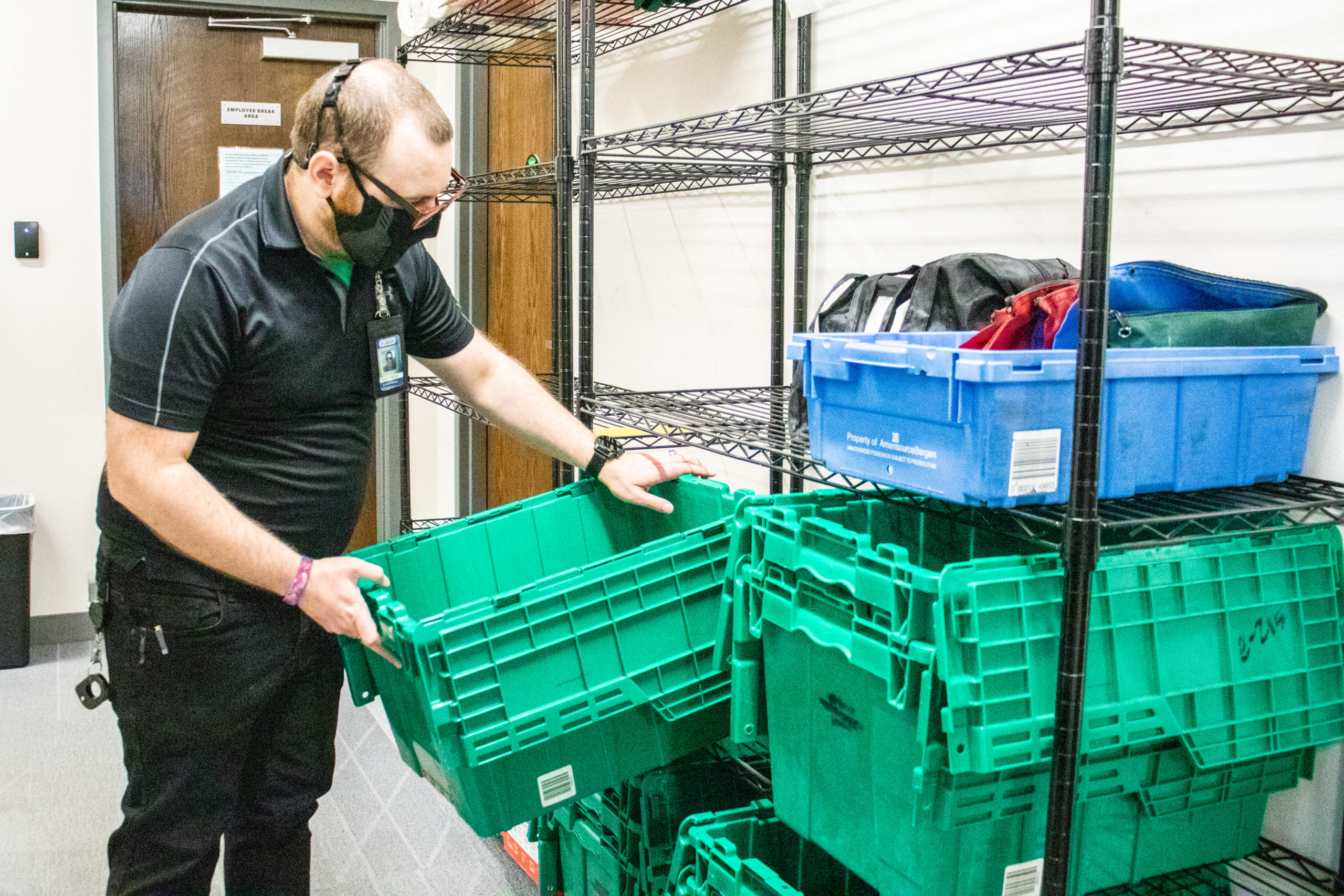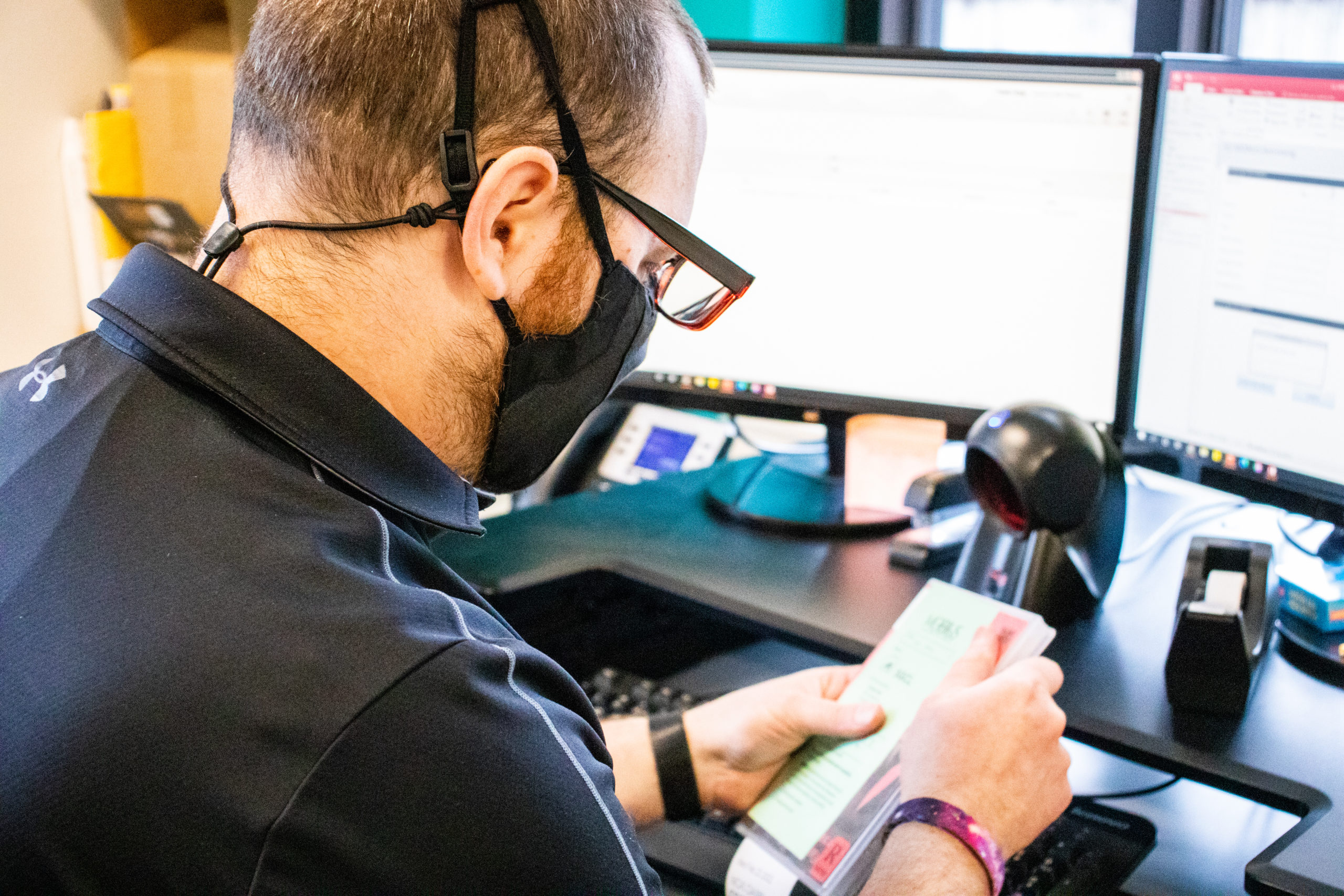
If you’ve ever been on the hunt for a book and found it wasn’t in the library’s collection, it’s likely you’ve utilized the hard work of the MOBIUS/ILL department. They’re the ones who take a request and use all resources at their disposal to fulfill it.
Without them, the library couldn’t provide near as much to its community.
In Good Hands
Kaleb is the MOBIUS/ILL Coordinator. I started my day with him, which was reassuring, because Kaleb’s been around for a while. He started as a librarian at the Ozark community branch years ago, but now the pride of his work is in finding unique solutions to patrons’ diverse needs.

And he works with a fantastic team, each member equally integral to the department: Ann, MOBIUS/ILL Assistant, Lindsey, MOBIUS/ILL Assistant, and Jen, a Library Assistant who works within the department.
So, how exactly does the MOBIUS/ILL team provide such an availability of items to their community?
Two Sides of the Same Coin
As its name suggests, the department has two sides: MOBIUS and ILL.
 MOBIUS (which is short for Missouri Bibliographic Information User System) is a group of libraries in Missouri and nearby states who lend materials to each other. Each library offers its own limited collection and, with many shared collections, you get a big catalog, so that everyone can benefit.
MOBIUS (which is short for Missouri Bibliographic Information User System) is a group of libraries in Missouri and nearby states who lend materials to each other. Each library offers its own limited collection and, with many shared collections, you get a big catalog, so that everyone can benefit.
You may want an obscure title that the library doesn’t have. Maybe you’ve even looked into buying a used copy online, but you can’t find it anywhere. That’s when Kaleb and his team come to the rescue. Through MOBIUS, you can simply search for the title to find a library in the system that has it. It may take a little extra time to arrive, but the point is that you still get it.
While MOBIUS operates through a program the library uses called Sierra and much of it is automatic, the other side of the department, ILL (Interlibrary Loans), consists of requests that must be fulfilled manually. Many times, ILL requests are for an item that even MOBIUS doesn’t have. For those materials that are hard to get, it’s up to Kaleb and his team to play detective, tracking down a request from wherever they can find it.
 Crates, Crates and More Crates
Crates, Crates and More Crates
 There are crates. Lots and lots of crates.
There are crates. Lots and lots of crates.
The morning I was with Kaleb, there was a stack of them. Deliveries of requested materials arrive in crates, or sometimes bags, and requests from other libraries’ patrons go out in crates. It’s a constant give-and-take that keeps the team busy from when the day’s delivery arrives to when they’ve finished processing all outgoing crates.
When part of our collection goes out to other libraries, they apply a green band of paper (you might already be familiar with it). This band includes information about the title, home library, borrower and any noted damage.
As for items returning from their journey abroad, the team assesses for damage and removes the green bands. These items are then returned to our collection.
Having a Last Resort
 By the end of my day with MOBIUS/ILL, I was surprised by how physical their job is. Sure, there’s a lot of processing and hunting for elusive items done on computers, but somebody’s got to do the preparation, packing, unpacking and shipping of materials.
By the end of my day with MOBIUS/ILL, I was surprised by how physical their job is. Sure, there’s a lot of processing and hunting for elusive items done on computers, but somebody’s got to do the preparation, packing, unpacking and shipping of materials.
Before I left, Kaleb put a bow on my experience when he recalled a story of helping a person who had looked everywhere for a book, even online marketplaces, and still couldn’t find it. They had lost hope but, even though it was a lot of hard work, Kaleb was able to find it for them. Helping somebody out when they have nowhere else to turn, Kaleb said, is why he does what he does.
Dedication and diligence like that, I say, is exactly what sets the library apart from anywhere else.
For more information about any of these services, contact MOBIUS/ILL at (417) 724-6100.



